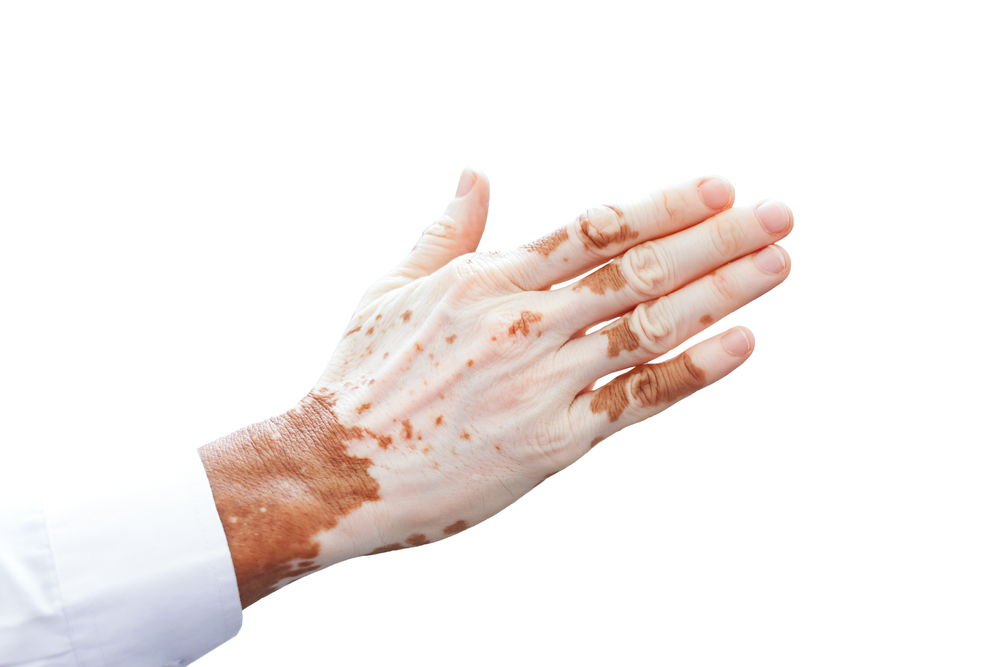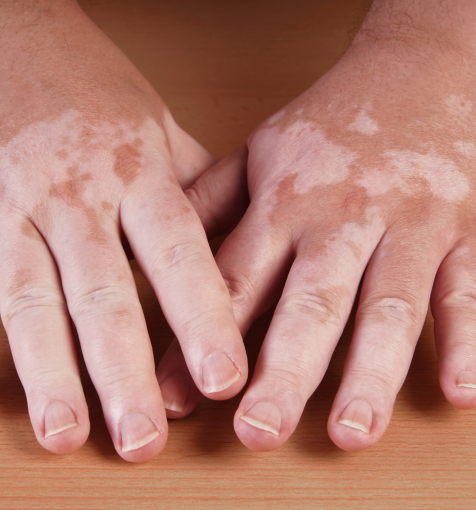Compassionate Care for Pigmentation Loss in New Jersey
Vitiligo is an autoimmune condition in which the immune system mistakenly attacks melanocytes—the cells responsible for skin pigmentation—causing patches of white skin to appear. While vitiligo is not contagious or life-threatening, it can significantly impact a patient’s confidence and quality of life. At Skin & Laser Center of NJ, we provide personalized, effective treatment options to help manage this condition and improve the appearance of affected areas.


Vitiligo occurs when melanocytes die or stop functioning, resulting in depigmented patches of skin. The condition can affect:
Skin on the hands, wrists, feet, elbows, knees, and around the eyes or mouth
Hair, including eyebrows and scalp
The inside of the mouth and eyes
Genital areas
Symptoms may include:
Patches of skin that sunburn easily
Changes in hair color in affected areas
Itchy skin in some patients
Rarely, changes to eye pigmentation or hearing loss
While vitiligo can develop at any age, most patients notice symptoms before age 21. Genetics and other autoimmune disorders—such as Hashimoto’s thyroiditis or alopecia areata—can increase the likelihood of developing vitiligo.
Patients often seek treatment if they experience:
Progressive or widespread loss of pigmentation
Cosmetic concerns that affect self-esteem or daily life
Emotional distress due to visible patches
Desire to slow progression or repigment affected areas
Because vitiligo is unpredictable, with some patches stabilizing while others expand, early intervention can be helpful for improving appearance and maintaining confidence.


Our providers offer a range of treatments tailored to each patient:
Topical medications: Corticosteroid creams or immune-modulating agents to encourage repigmentation
Phototherapy: Targeted light treatments to stimulate melanocyte activity
Camouflage therapies: Medical-grade makeup or skin tints to reduce contrast between affected and unaffected skin
Combination therapies: Personalized plans integrating multiple methods for optimal results
Treatments are designed with patient comfort and lifestyle in mind. While vitiligo may not be fully curable, professional care can minimize appearance changes, slow progression, and restore confidence.
Learn More About Vitiligo
While treatment cannot cure vitiligo, it can significantly mitigate symptoms. Many patients need to maintain routine treatments to continue to receive the beneficial results. Before developing a treatment plan, your provider will obtain a detailed medical and family history and conduct a thorough skin evaluation. You also may need a blood test to check the health of your thyroid gland because people with vitiligo often have an autoimmune thyroid disease as well.
After your dermatologist has diagnosed you with vitiligo, they will recommend one or more of the following treatments:
It is not possible to predict how a patient will respond to treatment, and it is important to keep in mind that no one treatment works for everyone, results can vary from one part of the body to another, and combining two or more treatments often gives the best results. The skincare team at Skin & Laser Center of NJ will work with you to identify the right treatment for you and develop a long-term treatment plan to address your symptoms.
Other pigmentation and vascular issues we treat at Skin & Laser of NJ include brown spots, port-wine stains, melasma, and facial redness—both connected with rosacea and associated with other conditions. Talk to our team about options for addressing your unique pigmentation problems.
Convenient walk in hours available below. No appointment needed! Accepting private insurance and medicare. No medicaid plans.
Learn more about medical treatments at New Jersey’s Skin & Laser Center of NJ. Call 201-500-7525 or contact us online to schedule a consultation.